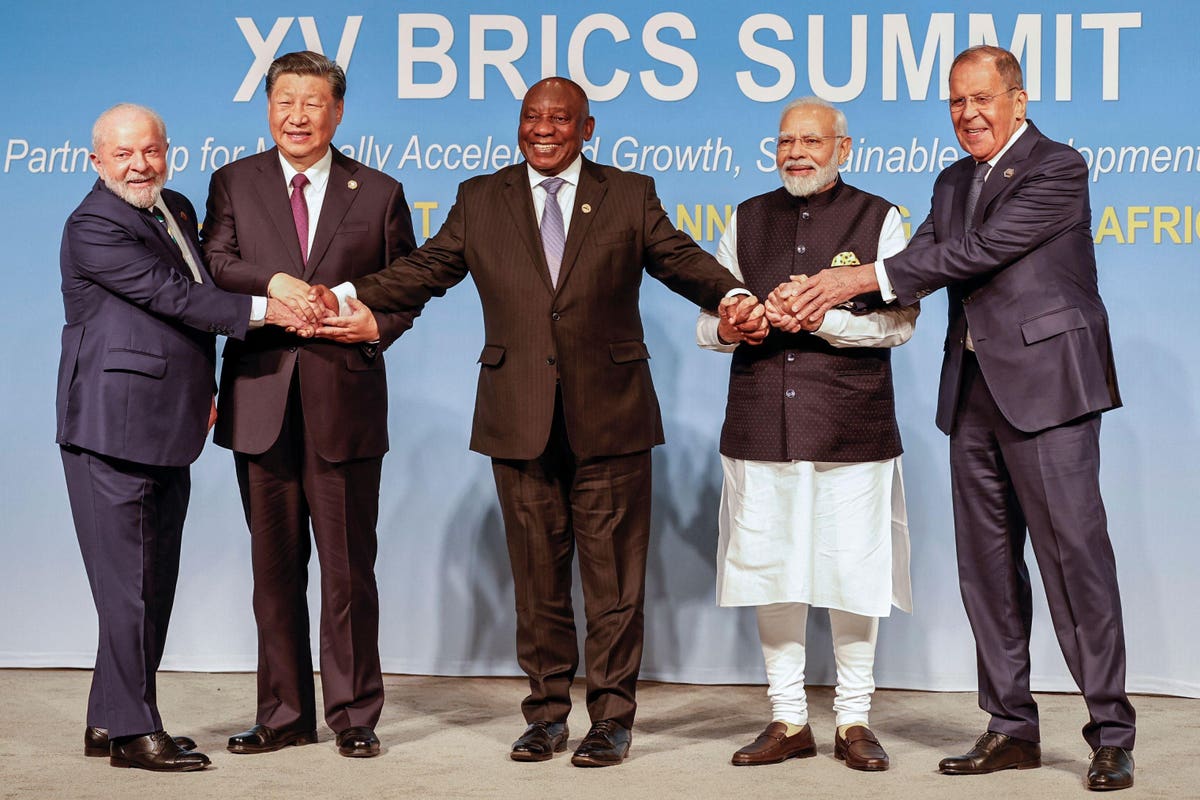One of the predictions I made in January’s annual predictions piece (8 Consequential Energy Predictions For 2023) was that the BRICS Alliance would vote to add Saudi Arabia as a member when it held its annual summit in South Africa on August 22-24. As things turned out, the voting BRICS members – Brazil, Russia, India, China, South Africa – went further than that last week, adding five new member countries in addition to Saudi Arabia.
Those other countries that will now be admitted into the trading alliance’s membership include Argentina, Egypt, Ethiopia, The United Arab Emirates (UAE) and Iran. Even though this constitutes an extraordinary move, one that comes with potentially enormous geopolitical implications, it has been interesting to note a somewhat muted reaction to it thus far from western governments and press.
But we will note it here by detailing 8 Consequential Energy Implications Of the BRICS Expansion:
Greater share of global oil production – A recent analysis published at VisualCapitalist.com finds that the new, expanded BRICS will now collectively represent 43% of global crude oil production. A recent estimate by Statisa finds that OPEC controls 38% of global crude. The geopolitical implications of this reality are obvious.
Higher level of economic dominance – Though some observers claimed as early as last December that the total BRICS GDP had already surpassed that of the G7, the addition of these six countries, including the trillion dollar-plus GDP of Saudi Arabia, ends all doubt. The same analysis by VisualCapitalist, based on publicly-available data, finds that BRICS will now control a combined 29% of global GDP. Obviously, energy constitutes a big driver of this economic dominance.
Greater cooperation between Saudi Arabia and Russia – As the major players in the OPEC+ alliance, Saudi Arabia and Russia have often conflicted with one another in the setting of official policy for that group. That was most notable in March 2020, when a major conflict between the two temporarily resulted in a near-break-up of the alliance entirely and caused a major crash in crude prices. It will be interesting to observe whether increased cooperation between the two in the broader BRICS trading alliance serves to smooth out further conflicts within OPEC+ operations.
Further bifurcation in global oil markets – In addition to now becoming a major power where crude oil supply is concerned, BRICS was already home to the world’s 1st and 3rd largest crude importers in China and India respectively. Oil analysts like S&P Global Vice Chairman Daniel Yergin have noted over the past year and a half the increasing bifurcation of global oil trading that has resulted mainly from Russia’s war with Ukraine. To the extent this expansion promotes new and enhanced oil trading relationships between BRICS partners, it will only serve to further divide what had previously been a single global market for the world’s most-traded commodity.
Diminution of U.S. and European Middle East influence? – Saudi Arabia’s leaders persisted with their pursuit of BRICS membership despite efforts by the U.S. and other western nations to convince them not to make the move. Those U.S. efforts included not only outreach by the State Department, but a visit to Riyadh last summer by President Joe Biden himself.
Why add Ethiopia? – Some are wondering why Ethiopia was added to the trading alliance given its modest level of economic might. The first obvious motivation is that Ethiopia has become a significant participant in China’s Belt and Road initiative. In January, Chinese Foreign Minister Qin Gang told reporters that “China supports Ethiopia in playing a greater role in international and regional affairs, and stands ready to communicate and cooperate with Ethiopia closely and be partners that jointly safeguard international fairness and justice.” In addition to that, Ethiopia occupies a strategic geographical position, situated at the mouth of the Red Sea, which provides access to the Suez Canal, a key trade route for Middle East oil and most other commodities.
What does Egypt’s admission have to do with energy? – It is perhaps not well-known, but thanks to major discoveries made over the last 20 years or so, Egypt currently ranks as the world’s 13th-largest producer of natural gas. That’s more than is produced by oil powers like the UAE, Mexico and Brazil, and probably factored into the decision for admission.
Energy likely helped Argentina’s case as well – While Argentina is not currently a major oil power, its Vaca Muerta shale play does hold promise of its becoming a more significant player in global natural gas markets, once a major pipeline project currently in development is completed.
The Bottom Line
Despite the relatively modest coverage in the western press, this major expansion of the BRICS Alliance comes with a wide variety of potentially impactful geopolitical implications. Not surprisingly, many of those implications have to do with a higher degree of influence the group will now hold over global markets and trading relationships related to crude oil, and to a lesser extent, natural gas.
Read the full article here





